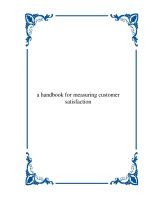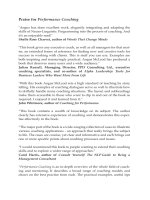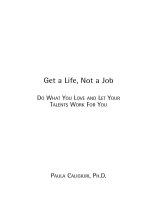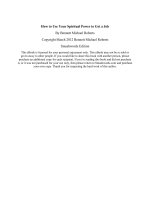Career building your total handbook for finding a job and making it work
Bạn đang xem bản rút gọn của tài liệu. Xem và tải ngay bản đầy đủ của tài liệu tại đây (4.86 MB, 289 trang )
CAREER
BUILDING
Your Total Handbook for
Finding a Job and
Making It Work
THE EDITORS OF
CareerBuilder.com
CONTENTS
INTRODUCTION
ix
SECTION ONE: FINDING “THE ONE”
1
CHAPTER 1: RÉSUMÉS AND COVER LETTERS
3
I. Writing Your Résumé
II. Making a Good Impression on Paper
III. Five Steps to an E-Friendly Résumé
IV. Cover Letter Dos and Don’ts
CHAPTER 2: FINDING THE JOBS
I. Where to Search
II. Search Online with Keywords
III. Cracking the Job Listing Code
IV. Protecting Yourself from Scams
V. Using a Staffing Firm or a Recruiter
3
19
24
28
37
37
38
39
41
44
CHAPTER 3: THE INTERNET VS. YOUR PROFESSIONAL IMAGE 49
I. What’s Happening on the Employer End
II. You’ve Got a Rep to Protect
III. It’s Not All Bad
IV. Damage Control
49
51
51
52
iv
Contents
CHAPTER 4: INTERVIEWS 101 AND BEYOND
55
I. Interview Basics
II. How to Answer Employers’ Questions
III. Questions to Ask the Employer
IV. Interview Body Language
V. Hiring Manager Secrets
VI. Interview Mistakes
VII. Damage Control
VIII. Thank-You Notes
57
59
65
69
72
73
76
77
CHAPTER 5: THE JOB OFFER
I. Weighing the Job Offer
II. Get Paid What You’re Worth
III. Salary Negotiation
IV. What to Say in Your Salary Talks
85
85
88
92
93
SECTION TWO: TOUGH LOVE AT WORK—
WORKPLACE FUNDAMENTALS
97
CHAPTER 6: WORK 101
99
I. Your First Days on the Job
II. Career Poison
III. Taming Workplace Mess
IV. Meetings
V. Defeating Distractions
VI. Working from Home
CHAPTER 7: USING, NOT ABUSING, TECHNOLOGY
I. E-Mail Gaffes
II. E-Mail: The Good, the Bad and the Ugly
III. Spies Like Us—Big Brother at Work
99
101
105
108
112
113
119
119
123
125
Contents
IV. IM-ing at Work
V. Cutting the E-Leash
CHAPTER 8: EXCUSE ME? CALLING IN SICK AND
COMING IN LATE
I. Taking Tardiness to the Next Level
II. The Art of Playing Hooky
III. No Excuses: When You Should Take a Sick Day
CHAPTER 9: WORK DON’TS
I. It’s Not Them, It’s You
II. Turning Your Irritating Behavior Around
III. Worst Things to Say at Work
IV. What You Wear . . . Head-to-Toe Taboos
CHAPTER 10: PLAYING NICE WITH CO-WORKERS
I. It’s Not You, It’s Them
II. Dealing with Office Scoundrels
III. Using Happy Hour to Get Ahead
IV. When Love Knocks on the Cubicle Wall
CHAPTER 11: WHO’S THE BOSS?
I. Impress the Boss
II. Things You Should Never Say to the Boss
III. Questions You Should Ask the Boss
IV. Sticky Situations
CHAPTER 12: MOVING ON UP
I. Performance Reviews
II. Surviving a Bad Review
III. Pitfalls to Avoid When Asking for a Raise
v
129
131
135
135
138
141
143
143
146
150
153
159
159
162
167
169
175
175
179
182
185
189
189
192
193
vi
Contents
SECTION THREE: WHEN YOUR JOB ISN’T WORKING OUT 197
CHAPTER 13: BURNOUT
I. Signs of Job Burnout . . . and What to Do About It
II. Coping with a Job You Hate
CHAPTER 14: QUITTING TIME?
I. It’s That Time . . .
II. Job Searching on Company Time
III. Gathering Good References
IV. Quitting Without Burning Bridges
199
200
202
205
205
209
211
215
CHAPTER 15: GETTING THE AX
221
I. Signs Your Job Is in Danger
II. Don’t Wait and See
III. How to Get Fired
IV. So You Were Fired
221
225
228
230
CHAPTER 16: MOVING ON
I. Certified Job-Hopper? Pros and Cons of Jumping
from Job to Job
II. Are You Employable?
III. Taking the Freelancing Route
IV. What Job Is Right for You?
V. Changing Careers
VI. A Job for Every Need
235
235
238
241
245
246
248
SO START BUILDING!
259
INDEX
261
ABOUT THE CONTRIBUTORS
OTHER BOOKS BY CAREERBUILDER.COM
CREDITS
COVER
COPYRIGHT
ABOUT THE PUBLISHER
INTRODUCTION
Did you know that 84 percent of Americans say they’re not in their
ideal jobs? Eighty-four percent!
With roughly 153 million people in the U.S. labor force and the
average American poised to hold 10.5 jobs in his or her lifetime, one
thing’s for certain: That’s a lot of job dissatisfaction.
To guide you through the sometimes scary world of work, we’ve
compiled this handbook for every step of your career. Why mess
with one book for résumés, another for interviewing and still another for salary negotiation? (Not to mention the self-help books
you might need once you start your job!) We’ve got everything right
here for you.
The editors of CareerBuilder.com, the United States’ largest
online job site, have assembled insider tips and tools for any stage
of your job search and career. We’ve divided this book into three
sections: job searching, managing your job and co-workers and
moving on to the next big thing.
The bottom line: Going to work is a lot of work. But having a
successful job search and positive working relationships isn’t rocket
science. It really comes down to some simple fundamentals. Forget
about all that touchy-feely stuff; we’re giving work advice straight
up. It’s tough love. We’re not going to tell you to plant a seed and
watch it grow . . . sometimes you don’t even have time to water it
before you know it’s rotten!
Section One
FINDING “THE ONE”
How many times have you been in this situation? You’re at a
party making small talk and you’re asked, “What do you do for a
living?” This is often followed with the obligatory, “Do you like
your job?” If the answer is an enthusiastic, “I love it!” chances are
you’ll be picking the other person up off the floor. That’s because
most people aren’t particularly satisfied with their work situations
and would rather be doing something else. This doesn’t necessarily
mean making a total career change, but finding the right environment, duties and colleagues that fit.
But job searching takes time and work. And, let’s face it, it’s
tough to find the time or energy to focus on a job hunt when you’ve
already got a full plate—your current job, family responsibilities,
housework, errands, trying to stay in shape and having some sort of
social life.
Whether you’ve had one job or thirty (ahem, is that something
to brag about?), everyone could use a little help in the job search
department. Even if you’ve never written a résumé before, we’ll hold
your hand through the process and, before you can say, “Hire me!”
we’ll have you in your next brilliant career.
What’s in it for you? Step-by-step résumé writing, cover letter
advice and tips on everything job search related; from learning how
to decode bogus job ads, to answering the most wrenching interview questions, to what to wear to make the best impression.
Chapter 1
RÉSUMÉS AND
COVER LETTERS
Welcome to the puzzling—and often frustrating—world of résumés and cover letters. These are your first chances to make a positive, lasting impression and therefore need to be done right. We’re
not saying there’s a “one size fits all” strategy, but we’ll guide you
through portraying your best professional self. Apply these steps
to your résumé and cover letter writing and put them to the test.
If you still don’t see results, go back, review some of these sections,
and start making some small adjustments. Eventually, you’ll get to
the right combination. When you notice employers are calling more
often and you’re getting more interviews, you’ll know you’re there.
I. WRITING YOUR RÉSUMÉ
STEP ONE: THE FORMULA
Hiring managers spend an average of one minute scanning a
résumé. You have just a short window of opportunity to convince
them that you’re either fabulous or the most boring person alive.
Which is it gonna be?
Here are the elements that your résumé should include:
4
CAREER BUILDING
Your name (if your formal name is
Abigail, but you go by Abby, use Abby), address, phone number,
e-mail address and Web site. Make sure to use a professional e-mail
address for your job applications. Employers aren’t likely to call
CAREER SUMMARY OR OBJECTIVE: These give the hiring manager an idea of who you are immediately—before spending the 60
seconds skimming your résumé and deciding whether to bring you
in for an interview. Many job seekers equate a summary with an objective. While both are two to three sentences appearing at the top
of your résumé, in reality, they are very different.
An objective states a job seeker’s desired job description, and is
often ideal for people who are just starting out in the workforce or
changing industries. Some words of warning: It could pigeonhole
you and limit how employers see you.
Consider this objective:
CONTACT INFORMATION:
“Recent college graduate with a bachelor’s degree in finance
and honors distinction seeks entry-level position in the accounting industry.”
If you are looking to take the next step in your chosen field, consider writing a career summary instead. A career summary gives an
overview of your work experience and/or relevant education.
This is a career summary:
“Marketing professional with more than ten years experience
in online, interactive marketing and advertising in a B2B
capacity.”
Is there an exception to these rules? Of course. It’s not necessary
to always include a career summary or an objective, but with hiring
Résumés and Cover Letters
5
managers spending less and less time reviewing résumés, this could
give you the edge by summarizing your experience and job goals.
SUMMARY OF QUALIFICATIONS: This calls out the most relevant
information for the job. If you include this, the hiring manager
doesn’t have to hunt for your abilities. This is an easy way to tailor
your résumé for each job application. Look at the required skills
listed in the job posting and use this as an opportunity to highlight
the skills needed for the job. If you are changing careers or industries, this section helps you highlight certain transferable skills.
TECHNICAL SKILLS: This is where you can show your computer
and software proficiency. Are you missing a technical skill listed in
the job description? Don’t throw in the towel. Seventy-eight percent
of hiring managers report they are willing to recruit workers who
don’t have experience in their particular industry or field and provide training/certifications needed.
WORK HISTORY: This is where you list chronologically any work
experience—titles, employer and dates of tenure. List only the most
recent and relevant information; no one cares about your ninthgrade babysitting club . . . unless you are looking for something in
childcare (even then, save it for your cover letter).
EDUCATION: Include your dates of graduation, college major and
minor, degrees earned or expected graduation date.
STEP TWO: KEYWORDS
You think you have it rough as a job seeker? Hiring managers sort
through anywhere from dozens to hundreds of prospective applicants, and some might argue that they have it worse.
Not buying it? We don’t blame you—especially because hiring
managers have made the job even easier for themselves in recent
years. Eager to minimize the task of manually sorting through application after application, employers are increasingly relying on
CAREER BUILDING
6
two tools: applicant tracking systems, which scan résumés for keywords relating to skills, training, degrees, job titles and experience,
and résumé databases, which employers search for candidates using
keywords (similar to how a job seeker searches for a job).
What does this mean for you, the job seeker? The bad news is
that a perfectly qualified applicant may never make it as far as an
interview merely because his or her résumé lacks certain keywords.
The good news is that by finding ways to include these keywords
in your résumé, you can gain a strategic advantage over other
applicants.
What the . . . ?
So what are these keywords? We’re told they’re essential to a job
search—we should use them in our résumé and cover letter and use
them when searching for job openings. But what are they really, and
how do you know you’re using the right ones? Keywords are specific
words or phrases that job seekers use to search for jobs, and employers use to find the right candidates.
Keywords most searched when scanning résumés and cover letters, according to CareerBuilder.com research:
• Problem solving and decision making—53 percent
• Oral and written communications—44 percent
• Leadership—35 percent
• Team building—33 percent
• Performance and productivity improvement—28 percent
• Project management—20 percent
• Customer retention—17 percent
Résumés and Cover Letters
7
• Strategic planning—13 percent
• Long-range planning—10 percent
• Cost reduction—10 percent
• Business development—10 percent
Other keywords hiring managers may deem important:
• Organizational design
• Internet
• Online
• Digital
• Competitive market
• Product positioning
• MBA
• New media
• E-commerce
DON’T GET LOST IN TRANSLATION. More and more large and
medium companies use applicant tracking software. You want to
make sure your résumé gets through the gatekeeper by presenting
your qualifications as if the reader is comparing the words on the
résumé to a list of desired qualifications.
How do you find out the right industry and position-specific
buzzwords to use? To understand which keywords and phrases
will be most effective for a successful job search, use the following
resources:
CAREER BUILDING
8
•
Search the job listing of the particular job you’re
applying for; it will be the best source for keywords that an
employer will use. Don’t copy the job ad word-for-word, but
do borrow some of the language and implement it throughout your résumé. Regurgitating your résumé shows a lack
of effort and an employer could dismiss you for doing that.
If you’re posting a résumé on a job board or industry Web
site, search multiple listings and look for the most common
buzzwords. Those words have the best chance of being found
by the search software.
•
PROFESSIONAL ASSOCIATIONS: Attend professional association meetings and visit their Web sites, paying attention to
industry jargon. Not only will you pick up industry-related
terminology that you can use in your résumé, cover letter and
during interviews, you will also have a chance to network
with other professionals in your field.
•
RECRUITERS OR HEADHUNTERS:
•
THE BUREAU OF LABOR STATISTICS (BLS): The BLS’s Occupational Outlook Handbook provides information on thousands of jobs and is a great source for job-related keywords.
JOB ADS:
If you’re working with a
recruiter or headhunter (also called staffing firm), ask for
input. Headhunters, whose job it is to know what companies
are looking for in a candidate, can tell you which keywords
are most relevant to the type of work you’re seeking.
SO GET KEYED UP. The more keywords you use, the more likely
your chances are of getting past a résumé-screening database; however, don’t randomly implement keywords just for the sake of having
keywords. Your résumé should both make sense to the human who
reviews it and be relevant to your own skills and experience. You
can also include a keyword summary at the bottom of your résumé.
This is simply a list of keywords relevant to your expertise.
Résumés and Cover Letters
9
Finally, don’t stop at your résumé. Utilize keywords in your cover
letter, interview and follow-up letter or e-mail, which will indicate
that you are knowledgeable about the company and the demands of
the job. Make a list of the words you use in your application materials and use those terms when you search online for jobs.
BY THE NUMBERS
Don’t go overboard with keywords. Forty-four percent of employers say they would automatically dismiss a résumé or
cover letter that appears to duplicate a job posting.
STEP THREE: LIST YOUR ACCOMPLISHMENTS
Hiring managers told CareerBuilder.com that the most important
things in a résumé or cover letter are:
• Relevant experience—73 percent
• Specific accomplishments—46 percent
• Customized to the position—37 percent
• Succinct representation of info—36 percent
• Simple format—25 percent
• Strong objective or career summary—23 percent
• Academic degree—20 percent
Lesson: Vague phrases just don’t cut it. This is reason numero
uno why you should be constantly updating your résumé. The
longer you wait, the more difficult it is to recall the details.
You need to show specific, quantifiable results. Show how you
saved your previous employer money, made money for the busi-
10
CAREER BUILDING
ness, grew the business, cut costs, improved productivity or added
clients.
For example:
Instead of, “Effectively managed accounts payable team,” write
“Managed team of 15 accounts payable specialists and improved
productivity by 15 percent with smaller lag time between invoicing
and payment.”
Write down all the duties for each job on your résumé and then
try to add specific numbers to each duty.
SIMPLE RÉSUMÉ TRICK
When was the last time you updated your résumé? Probably
not since the last time you looked for a new job, right? Just
as you schedule your regular dental appointment, get into
the habit of storing information that could be added to your
résumé. OK, so actually updating your résumé regularly is
somewhat of a long shot. Here’s an easy way to keep track of
your best accomplishments. Whenever you get the results of a
project you worked on, say your monthly sales numbers, send
a note about it to your personal e-mail account. Save all these
e-mails in a folder marked “résumé” and make the changes
quarterly or annually.
Don’t forget your soft skills
Yes, we’ve been pushing the showcasing of accomplishments down
your throat, but there’s also something to be said about soft skills.
“Soft skills” refer to a cluster of personal qualities, habits, attitudes and social graces that make someone a good employee and
compatible co-worker. Companies value soft skills because research
suggests and experience shows that they can be just as important an
indicator of job performance as hard skills.
Résumés and Cover Letters
11
Try getting in touch with your soft side. Some of the most
common soft skills employers are looking for and will be assessing
you on include:
•
Are you motivated and dedicated to
getting the job done, no matter what? Will you be conscientious and do your best work? Or are you the poster child for
slacker? Are you most likely found napping in your car at
lunch?
•
Are you optimistic and upbeat? Will
you generate good energy and good will? Or are you Debbie
Downer?
•
GOOD COMMUNICATION SKILLS: Are you both verbally
articulate and a good listener? Can you make your case and
express your needs in a way that builds bridges with colleagues, customers and vendors? Or do you leave people with
bewildered looks on their faces?
•
TIME MANAGEMENT ABILITIES: Do you know how to prioritize tasks and work on many different projects at once? Will
you use your time on the job wisely?
•
Are you resourceful and able
to creatively solve problems that will inevitably arise? Will
you take ownership of problems or leave them for someone
else?
•
ACTING AS A TEAM PLAYER: Will
•
SELF-CONFIDENCE: Do you truly believe you can do the job?
Will you project a sense of calm and inspire confidence in
STRONG WORK ETHIC:
POSITIVE ATTITUDE:
PROBLEM-SOLVING SKILLS:
you work well in groups
and teams? Will you be cooperative and take a leadership role
when appropriate? Or if things don’t go your way will you
take your ball and go home?
CAREER BUILDING
12
others? Will you have the courage to ask questions that need
to be asked and to freely contribute your ideas?
Will you
be able to handle criticism? Are you coachable and open to
learning and growing as a person and as a professional?
•
ABILITY TO ACCEPT AND LEARN FROM CRITICISM:
•
FLEXIBILITY/ADAPTABILITY:
•
WORKING WELL UNDER PRESSURE:
Are you able to adapt to new
situations and challenges? Will you embrace change and be
open to new ideas?
Can you handle the
stress that accompanies deadlines and crises? Will you be able
to do your best work and come through in a pinch?
Focus on the skills most likely to interest the prospective employer and learn to demonstrate these skills through your résumé,
in an interview or in dealing with potential employers at career fairs
or industry association gatherings.
For example, tell a story of how you successfully handled a crisis or
challenge at your company. Mention honors you received or even bring
along letters of thanks or commendation from an employer or customer.
TRUE JOB SEEKER STORY
One job applicant brought a legal representative to speak on
his behalf at a job interview. Incidentally, he didn’t get the job.
STEP FOUR: CHECK FOR MISTAKES
A résumé in and of itself may not get you that killer job, but if you
blunder in composing it, you might kill any chance for an interview.
You send a very negative message about your quality of work and
attention to detail if your résumé and cover letter contain errors.
Résumés and Cover Letters
13
Don’t rely on your computer’s spell-check function. Your computer
won’t know if you negotiated with unions or onions, or were named
manager or manger.
Even if you are a prolific writer, its easy to miss a typo especially
after reviewing the document numerous times. After you proofread
you résumé a few times, ask someone else to review it. A second
pair (or more) of eyes may be able to catch mistakes you missed and
could provide a fresh prospective on how to improve your résumé.
Stop! How carefully did you read that last paragraph? If you noticed the three mistakes, you probably wouldn’t want to hire us. And
if you didn’t notice them, get someone to review your résumé stat!
(Errors: “its” in the first sentence should be it’s; the second “you”
in the second sentence should be your; and “prospective” in the last
sentence should be “perspective.”)
POP QUIZ: What percentage of hiring managers automatically
dismiss résumés or cover letters with spelling or grammatical
errors?
A) 25 percent
B) 33 percent
C) 57 percent
D) 66 percent
ANSWER: C. Fifty-seven percent of hiring managers told Ca-
reerBuilder.com that résumés and cover letters with errors or
typos go straight into the trash bin. Proofread carefully.
Quick fixes to common résumé problems
When it comes to résumés, one size does not fit all. A former supervisor looking for work in a new industry will not have the same
résumé as someone who graduated two months ago.
14
CAREER BUILDING
Fortunately, you don’t need to panic because you have a circumstance that makes your job hunt a little different than some candidates out there. Here are some quick ways to customize your résumé
to your specific needs:
YOU LACK EXPERIENCE: When it comes to the education requirements, you’ve got that covered. What you’re missing is work
experience, unless you want to fill your résumé with the details of
your childhood paper route and lemonade stand. First, look at the
work you’ve done and highlight the jobs with transferable skills.
A retail position probably taught you a lot about customer service
and dealing with clients. Also, don’t be afraid to include volunteer
work, which can display relevant skills and shows your commitment
to a cause; 81 percent of employers consider volunteering as work
experience. Your involvement in clubs and organizations, such as a
fraternity or sorority, can also be important if you held a leadership
position. Almost one-third of employers say participation in fraternal organizations qualifies as relevant experience; 19 percent say the
same for athletic activities.
YOU’VE HAD A LONG ABSENCE FROM THE WORK FORCE: If you
have the experience but have been out of work for a while, your
résumé will have a noticeable employment gap. Don’t lie by extending the length of employment at your last job because that’s
information employers can find out in one phone call. Instead, be
sure the experience you do have addresses the requirements of the
position. Also, mention any refresher courses you took or volunteering you did during your absence. Don’t give the hiring manager the
chance to wonder whether you’re out of touch with current technology or industry practices.
YOUR MOST RECENT JOB LASTED SIX MONTHS: As much as you
want a new job to turn into a career you love, it doesn’t always
work out that way. If you left your last job after only a few months
because nothing turned out to be what you expected, think about









